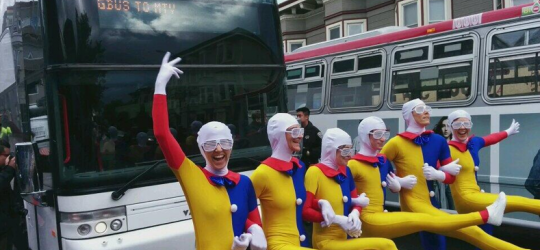The road to regulating Google Buses has a new pothole: a lawsuit.
A lawsuit filed in San Francisco Superior Court today demands the San Francisco Municipal Transportation Agency’s commuter shuttle pilot program be set aside while a full environmental review is conducted under the California Environmental Quality Act.
“We know that these buses are having devastating impacts on our neighborhoods, driving up rents and evictions of long-time San Francisco residents,” Sara Shortt, executive director of the Housing Rights Committee of San Francisco and one of the lawsuit petitioners, said in a press statement. “We’ve protested in the streets and taken our plea to City Hall to no avail. We hope to finally receive justice in a court of law.”
The suit was filed against the City and County of San Francisco, Mayor Ed Lee, the Board of Supervisors, the SFMTA, Google, Genentech, Apple, and a handful of private transportation providers. It alleges the tech shuttle pilot project is in violation of the California Vehicle Code which prohibits any vehicle, except common carriers (public buses), to pull into red zones that are designated as bus stops. It also alleges the city abused its discretion and violated the CEQA by exempting the Shuttle Project from environmental review.
The Coalition for Fair, Legal and Environmental Transit, Service Employees International Union Local 1021, the union’s Alysabeth Alexander, and Shortt are the petitioners of the suit. In early April, they also petitioned the Board of Supervisors to vote for an environmental review of the tech shuttles.
The contentious meeting lasted over 7 hours, with housing advocates and tech workers firing shots from both sides into the night. Ultimately the supervisors voted 8-2 against the environmental review, a move seen as driven by a deferential attitude towards the technology industry in San Francisco.
Paul Rose, a spokesperson for the SFMTA, responded to the lawsuit in an email to the Guardian.
“The agency developed this pilot proposal to help ensure the most efficient transportation network possible by reducing Muni delays and congestion on our roadways,” Rose wrote. “We have not yet had a chance to review the lawsuit and it would not be appropriate to comment on any pending litigation.”
The early April vote was only the latest in the city’s alleged deferential treatment towards the commuter shuttles.
The SFMTA allowed the shuttles to use Muni bus stops for years without enforcing illegal use of red zones, the suit alleges. A study by the city’s Budget and Legislative analyst revealed that out of 13,000 citations written to vehicles in red zones in the last three years only 45 were issued to tech shuttles — despite the SFMTA’s knowledge of 200 “conflicting” bus stops between Muni and the tech shuttles.
Much has been made of those startling numbers, with petitioners alleging a “handshake deal” on the part of the SFMTA to tech company shuttles, allowing them to park at red zones at will.
But emails the Guardian obtained by public records request show Carli Paine, head of the tech shuttle pilot program, followed up complaints on illegal stops made by tech shuttles since 2010, but to no avail.
“Know that I have made clear to the shuttle providers that the law says that it is not legal to stop in the Muni Zones,” Paine wrote in a July 2012 email to a colleague who was in contact with tech companies. “Participating in this process does not mean that they are guaranteed not to get tickets–especially if they are doing things that create safety concerns or delay Muni.”
Paine also attempted to clarify enforcement policies around the shuttles with enforcement officers from the SFPD and SFMTA, also to no avail, the emails show.
The deferential treatment to shuttles may not have originated from the SFMTA then, but from higher up the political ladder.
“There are a number of our supervisors who do not want to buck the tech industry,” Shortt told the Guardian. “They feel there may be more to gain from allowing illegal activity to continue by these corporations than support.”
But does the suit call for the tech shuttles to stop running? We asked Richard Drury, the attorney filing the suit, to explain the specific asks of the suit.
“Not technically no,” Drury said. “They’ve operated illegally for years and the city turned a blind eye. They could continute to do that while the city runs an environmental review, but if the SFMTA or Police Department decided to start ticketing them for $271, they could.”
So the lawsuit wouldn’t stop the shuttles. It just asks for them to be reviewed.
Among issues regarding air quality the shuttles’ heavy weight damages city streets at much higher rates than cars, studies by the city’s Budget Legislative Analyst showed. Studies conducted by students and other interested individuals revealed increased rents near shuttle stops, which the filers of the lawsuit say leads to a displacement of residents.
Displacement is a consideration in CEQA reviews, a recent addition to state law.
“We’re just asking for the city to study the impacts,” Drury said. “Maybe that means the shuttles get clean fuel, or corporations pay to offset displacement of residents.”

